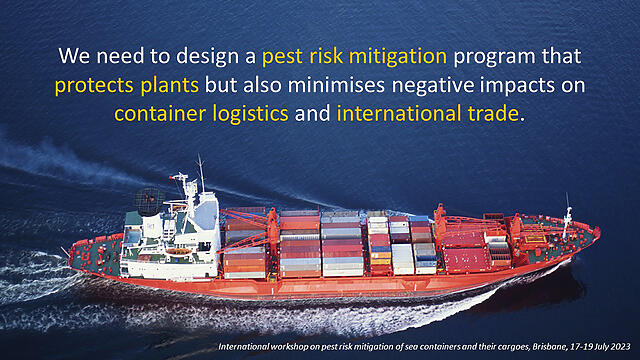International collaboration on sea container cleanliness
Australia is spearheading international efforts to manage biosecurity risks associated with the sea container pathway.
Sea containers are at the heart of global trade. Over 80% of global trade (by volume) is transported by sea, resulting in over 241 million sea container movements around the globe each year. Unfortunately, sea containers are also a key pathway for the spread of plant and environmental pests, diseases and contaminants across the world.
Some pests have a specific biology or behaviour that enables them to ‘hitch a ride’ into countries within or on shipping containers, imported goods and other forms of transportation. These are known as hitchhiker pests and include khapra beetle, brown marmorated stink bug, and invasive snails and ants. Such pests can have devastating effects on agriculture, amenity and food security, and end up costing countries millions of dollars. Unfortunately, the global movement of these pests is increasing.
So how can the global community minimise the threat of hitchhiker pests via sea containers without disrupting trade? Representatives from across the globe met in July to discuss just this question when the International Plant Protection Convention (IPPC) Secretariat and the department co-hosted an international workshop on ‘pest risk mitigation of sea containers and their cargoes and the facilitation of international trade’ in Brisbane. Building on the success of a similar workshop in London in September 2022, this workshop was tasked with ‘defining a way forward’ on the topic.
Organisers built collaboration into the design of the workshop. Participants from across the world were able to share candidly and provide feedback on the suite of regulatory and commercial global solutions being considered by the IPPC Sea Containers Focus Group. It enabled an open dialogue between the international plant protection community, research organisations and industry.
“This global problem needs global solutions,” said Dr Gabrielle Vivian-Smith in the lead up to the event. In her opening remarks to the workshop, she stressed that effective communication, information sharing, and collective resolve were critical to reducing the plant health risks along the sea container pathway. She acknowledged the importance of raising awareness of the issues faced by stakeholders that are not involved in the trade of plants and plant products, and urged all participants to contribute to solutions.
The department is exploring innovative technologies to enhance automatic detection capabilities, researching modifications to sea container design and leading global discussions on comprehensive solutions to mitigate this risk. These activities are part of the department’s Hitchhiker Pest Program and will play an important role in informing the IPPC’s efforts in developing a comprehensive global strategy.
For more information on the workshop, go to: https://www.ippc.int/en/core-activities/capacity-development/sea-contai…
View Original | AusPol.co Disclaimer
